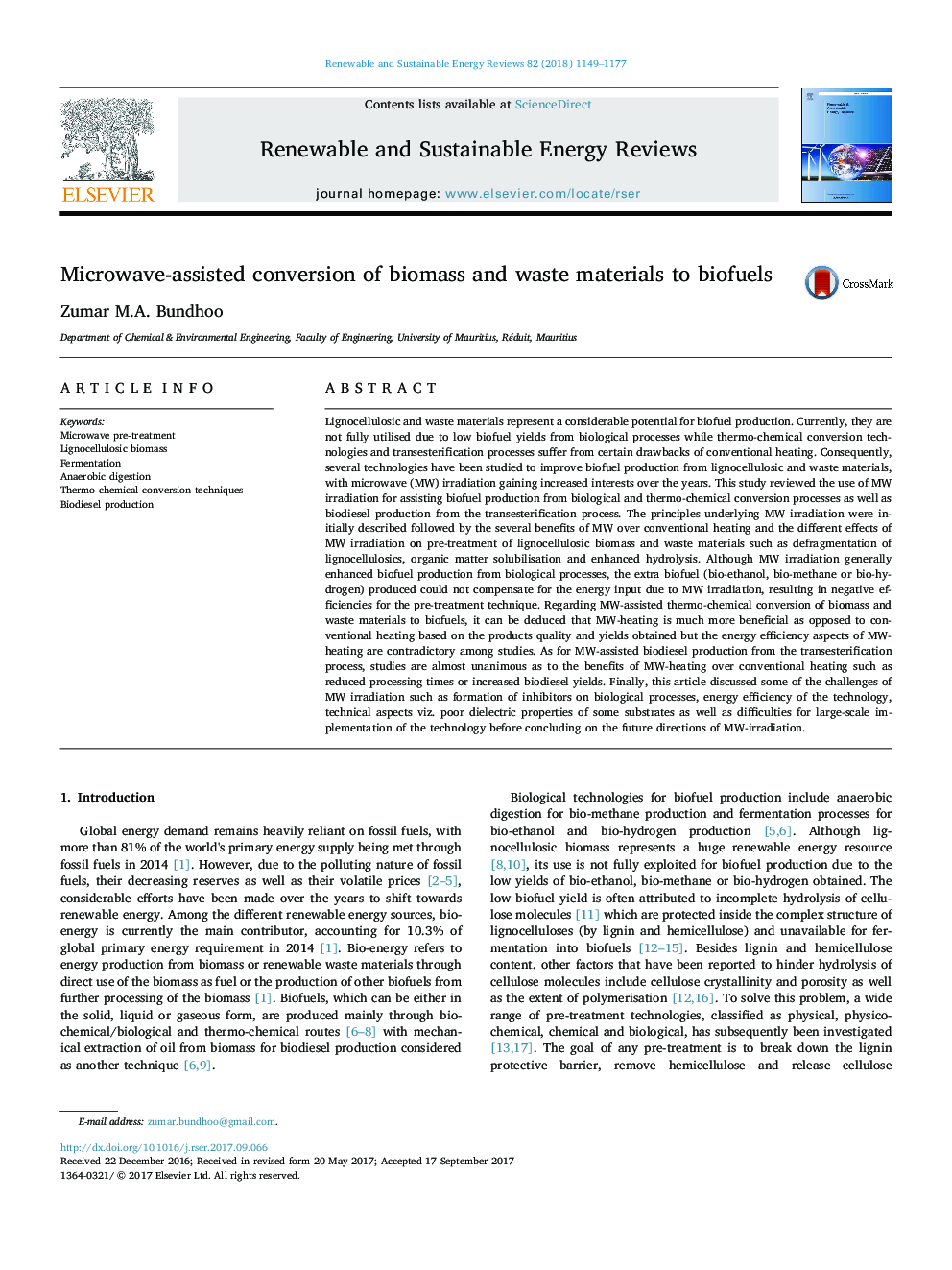| کد مقاله | کد نشریه | سال انتشار | مقاله انگلیسی | نسخه تمام متن |
|---|---|---|---|---|
| 5481932 | 1522304 | 2018 | 29 صفحه PDF | دانلود رایگان |
عنوان انگلیسی مقاله ISI
Microwave-assisted conversion of biomass and waste materials to biofuels
ترجمه فارسی عنوان
انتقال مایکروویو از زیست توده و مواد زائد به سوخت های زیست محیطی
دانلود مقاله + سفارش ترجمه
دانلود مقاله ISI انگلیسی
رایگان برای ایرانیان
کلمات کلیدی
پیش درمان مایکروویو، زیست توده لیگنوسلولوزیک، تخمیر هضم بی هوازی تکنیک های تبدیل حرارتی شیمیایی، تولید بیودیزل،
موضوعات مرتبط
مهندسی و علوم پایه
مهندسی انرژی
انرژی های تجدید پذیر، توسعه پایدار و محیط زیست
چکیده انگلیسی
Lignocellulosic and waste materials represent a considerable potential for biofuel production. Currently, they are not fully utilised due to low biofuel yields from biological processes while thermo-chemical conversion technologies and transesterification processes suffer from certain drawbacks of conventional heating. Consequently, several technologies have been studied to improve biofuel production from lignocellulosic and waste materials, with microwave (MW) irradiation gaining increased interests over the years. This study reviewed the use of MW irradiation for assisting biofuel production from biological and thermo-chemical conversion processes as well as biodiesel production from the transesterification process. The principles underlying MW irradiation were initially described followed by the several benefits of MW over conventional heating and the different effects of MW irradiation on pre-treatment of lignocellulosic biomass and waste materials such as defragmentation of lignocellulosics, organic matter solubilisation and enhanced hydrolysis. Although MW irradiation generally enhanced biofuel production from biological processes, the extra biofuel (bio-ethanol, bio-methane or bio-hydrogen) produced could not compensate for the energy input due to MW irradiation, resulting in negative efficiencies for the pre-treatment technique. Regarding MW-assisted thermo-chemical conversion of biomass and waste materials to biofuels, it can be deduced that MW-heating is much more beneficial as opposed to conventional heating based on the products quality and yields obtained but the energy efficiency aspects of MW-heating are contradictory among studies. As for MW-assisted biodiesel production from the transesterification process, studies are almost unanimous as to the benefits of MW-heating over conventional heating such as reduced processing times or increased biodiesel yields. Finally, this article discussed some of the challenges of MW irradiation such as formation of inhibitors on biological processes, energy efficiency of the technology, technical aspects viz. poor dielectric properties of some substrates as well as difficulties for large-scale implementation of the technology before concluding on the future directions of MW-irradiation.
ناشر
Database: Elsevier - ScienceDirect (ساینس دایرکت)
Journal: Renewable and Sustainable Energy Reviews - Volume 82, Part 1, February 2018, Pages 1149-1177
Journal: Renewable and Sustainable Energy Reviews - Volume 82, Part 1, February 2018, Pages 1149-1177
نویسندگان
Zumar M.A. Bundhoo,
